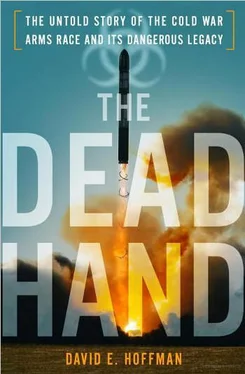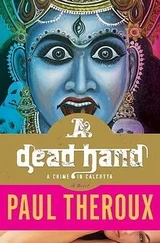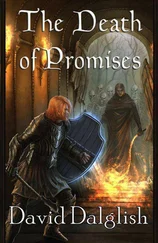5 See “Facts and Problems Related to Radioactive Waste Disposal in Seas Adjacent to the Territory of the Russian Federation,” Office of the President of the Russian Federation, Moscow, 1993.
6 Yablokov, interview, June 25, 1998. Yeltsin formed the commission Oct. 24, 1992.
7 After the Bush-Gorbachev unilateral withdrawals in September and October 1991, talks with Moscow made little progress, Undersecretary of State Reginald Bartholomew told Congress. “Trip Report: A Visit to the Commonwealth of Independent States,” Senate Armed Services Committee, 102nd Congress, 2 ndSession, S Prt. 102-85, March 10, 1985.
8 “Next Steps on Safety, Security, and Dismantlement,” Jan. 24, 1992, cable to the State Department and the White House from Moscow. Declassified in part to author Sept. 22, 2006, under FOIA.
9 Burns, interview, Aug. 12, 2004.
10 “Delegation on Nuclear Safety, Security and Dismantlement (SSD): Summary Report of Technical Exchanges in Albuquerque, April 28—May 1, 1992,” State Department cable.
11 Note made by a participant who asked to remain anonymous, undated.
12 Keith Almquist, communications with author, Dec. 14, 2008, and Jan. 24, 2009. Later, Sandia procured materials for another ninety-nine upgrades and sent these in standard shipping containers to a Russian rail car factory in Tver, Russia, and then contracted with the factory to do the conversions. The upgrades involved changing the insulation and locking down the movable platform. Sandi also provided alarm-monitoring equipment. Some older Russian rail cars were made of wood. The United States also provided armored blankets and “supercontainers” to protect warheads from gunfire.
13 “President Boris Yeltsin’s Statement on Arms Control,” TASS, Jan. 29, 1992.
14 This account is based on Mirzayanov interview, July 26, 2008; Mirzayanov, Vyzov (Kazan: Dom Pechati, 2002), published in English as State Secrets: An Insider’s Chronicle of the Russian Chemical Weapons Program (Denver: Outskirts Press, 2009); and Mirzayanov, “Dismantling the Soviet/Russian Chemical Weapons Complex: An Insiders View,” in Amy Smithson, ed., Chemical Weapons Disarmament in Russia: Problems and Prospects (Washington, D.C.: Stimson Center, October 1995), pp. 21–34.
15 On the Lenin Prizes, Mirzayanov originally believed they were for the binary novichok agents, but later learned that they had received the prize for creating another binary.
16 The article was signed by Mirzayanov and Lev Fedorov, a chemist who, in the 1990s, founded and headed the Association for Chemical Security, a group concerned about storage and destruction of chemical weapons arsenals.
17 His coauthor, Fedorov, was interrogated, as were some journalists, but not charged.
18 The Convention on the Prohibition of the Development, Production, Stockpiling and Use of Chemical Weapons and on Their Destruction was adopted in Geneva on Sept. 3, 1992, by the Conference on Disarmament. It was opened for signature in Paris from Jan. 13 to 15, 1993, and entered into force on April 29, 1997. Both Russia and the United States ratified the treaty.
19 Mirzayanov drew support from around the world. Scientists, politicians and human rights activists wrote letters on his behalf to the authorities in Moscow. Mirzayanov and Colby later married. Mirzayanov now lives in the United States.
20 On March 11, 1994, the attorney general closed the case. During the proceedings, another disenchanted veteran of the chemical weapons program, Vladimir Uglev, had corroborated what Mirzayanov said. Uglev later threatened to release the formulas of the novichok agents unless the case was dropped. Oleg Vishnyakov, “Interview with a Noose Around the Neck,” Novoye Vremya , Moscow, no. 6, Feb. 1993, pp. 40–41, as translated in JPRS-UMA-92-022, June 29, 1993. Vladimir Uglev, interview, June 10, 1998. Uglev said his threat to reveal the formulas was a bluff. “I don’t know if I could have done that,” he said.
21 This account is based on interviews with Blair, Feb. 20 and March 9, 2004; The Logic of Accidental Nuclear War (Washington, D.C.: Brookings Institution Press, 1993); “The Russian C 3I,” a paper by Valery E. Yarynich, Feb. 24, 1993, and a copy of Yarynich’s review, May 31, 1993, both courtesy of Blair; and interviews with Yarynich.
22 Yarynich had already made two authorized presentations overseas on nuclear command and control. On April 23–25, 1992, Yarynich was delegated by the General Staff to participate in a conference in Estonia, and he made another presentation Nov. 19–21, 1992, in Stockholm.
23 After Blair’s op-ed appeared, Yarynich wrote his own article, emphasizing the role of Perimeter as a “safety catch” against a mistaken launch. He also called for more openness about nuclear command and control systems. “The Doomsday Machine’s Safety Catch,” New York Times , Feb. 1, 1994, p. A17. Other articles began to appear by Russian experts on Perimeter, and Yarynich published a more detailed description in his book, C 3: Nuclear Command, Control, Cooperation (Washington, D.C.: Center for Defense Information, 2003), pp. 156–159.
CHAPTER 20: YELTSIN’S PROMISE
1 Braithwaite, Across the Moscow River (New Haven: Yale, 2002), pp. 142–143. Also, Braithwaite diary entries and communication with author, May 19, 2008. A confidential source told the author Yeltsin also called the biological weapons scientists “misguided geniuses.”
2 James A. Baker III, The Politics of Diplomacy: Revolution, War and Peace, 1989–1992 (New York: G.P. Putnam’s Sons, 1995), p. 620. On the same day he met with Baker, Yeltsin issued a lengthy statement on arms control in which he declared that Russia “is for strict implementation of the 1972 Biological Weapons Convention.” “President Boris Yeltsin’s Statement on Arms Control,” TASS, Jan. 29, 1992. Also, Ann Devroy, R. Jeffrey Smith, “U.S., Russia Pledge New Partnership; Summits Planned in Washington, Moscow,” Washington Post , p. A1, Feb. 2, 1992.
3 Popov, interview, May 16, 2005; Gait, communication with author, July 7–8, 2008.
4 Ken Alibek with Stephen Handelman, Biohazard: The Chilling True Story of theLargest Covert Weapons Program in the World—Told from the Inside by the Man Who Ran It (New York: Random House, 1999), pp. 242–244.
5 Braithwaite, journal entry.
6 At the Third Review Conference of the BWC, held in Geneva Sept. 9–27, 1991, the parties, which included the Soviet Union, agreed to a series of confidence-building measures, including “declaration of past activities in offensive and/or defensive biological research and development programmes” and agreed that exchange of data should be sent annually to the U.N. no later than April 15, covering the previous calendar year.
7 “Decree of the President of the Russian Federation from April 11, 1992, No. 390, On Providing Fulfillment of International Obligations in the Field of Biological Weapons.”
8 In his diary Braithwaite wrote of his reaction, “I say that the right response is to take it at face value, and that the Prime Minister should ram the thought home by sending Yeltsin a personal message congratulating him on his courageous and decisive action. That will make it harder for the Russians to backslide or weave about.” Braithwaite, diary entry, April 23, 1992.
9 “Declaration of Past Activity Within the Framework of the Offensive and Defensive Programs of Biological Research and Development,” also known as “Form F.” Yeltsin admitted to the newspaper Izvestia the military was trying to hide the biological weapons program from him. He recalled his conversation with Bush at Camp David this way: “I said I could not give him firm assurances of cooperation. Certainly, this is not acceptable among politicians, but I said this: ‘We are still deceiving you, Mr. Bush. We promised to eliminate bacteriological weapons. But some of our experts did everything possible to prevent me from learning the truth. It was not easy but I outfoxed them. I caught them red-handed.’” Yeltsin offered few details but said he had discovered two test sites where experts were experimenting with anthrax on animals. Izvestia , April 22, 1992.
Читать дальше












